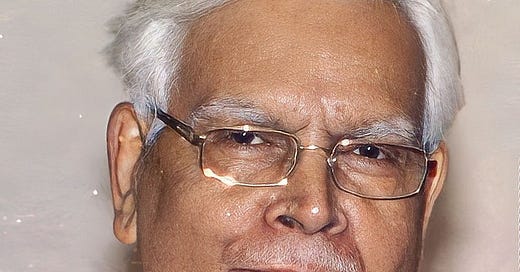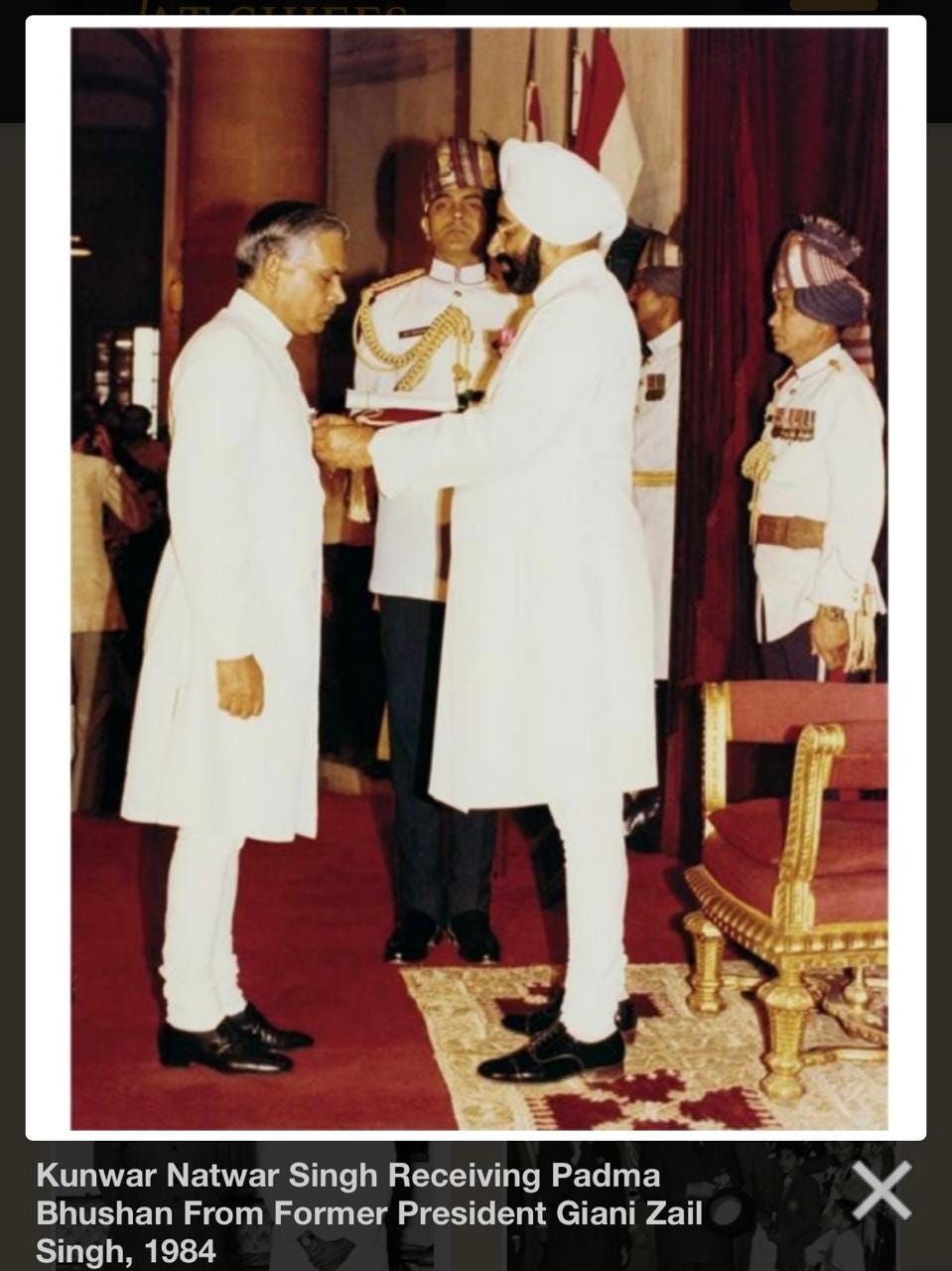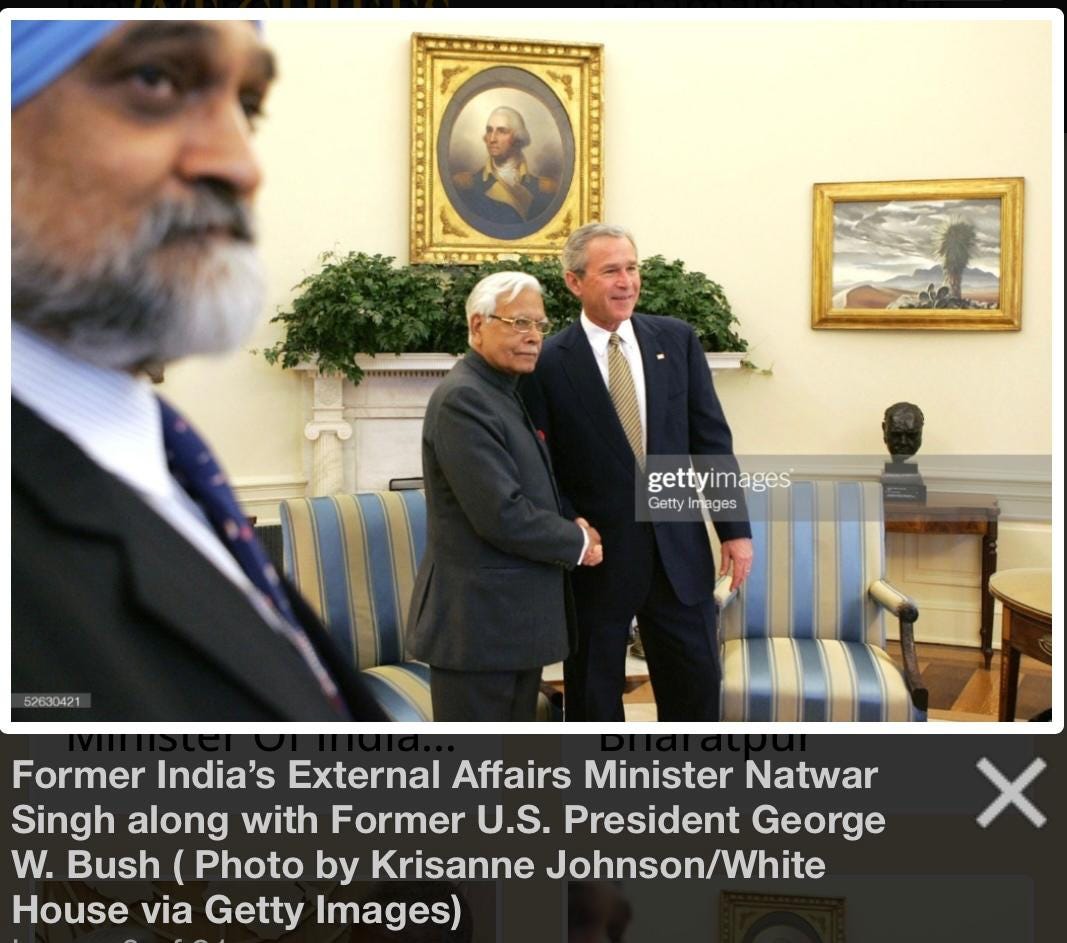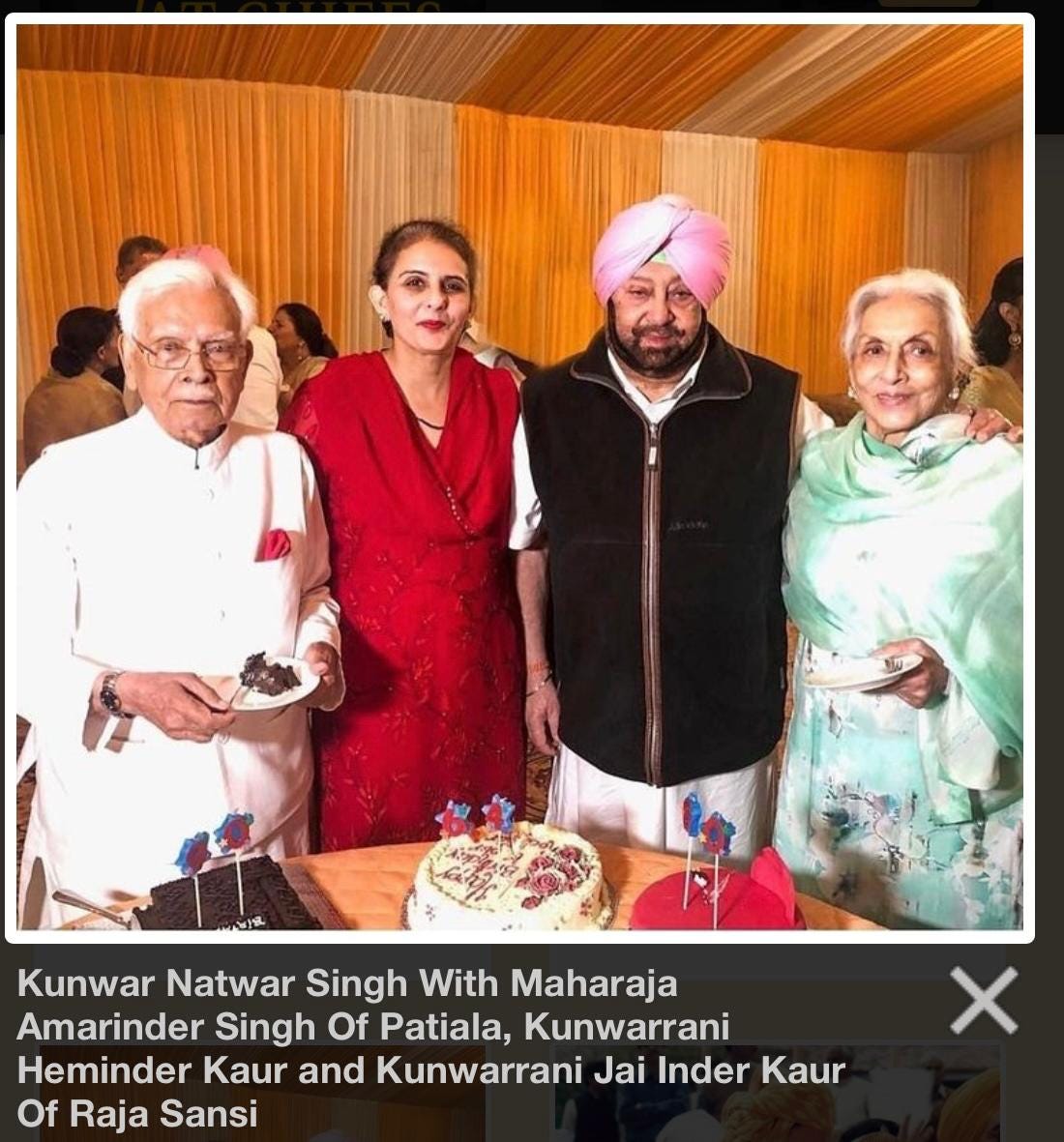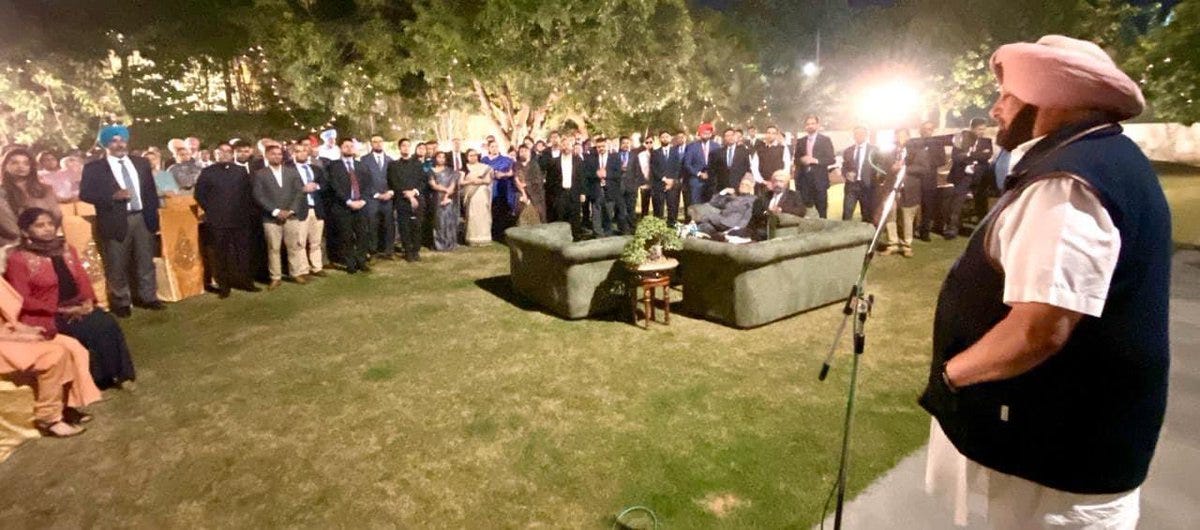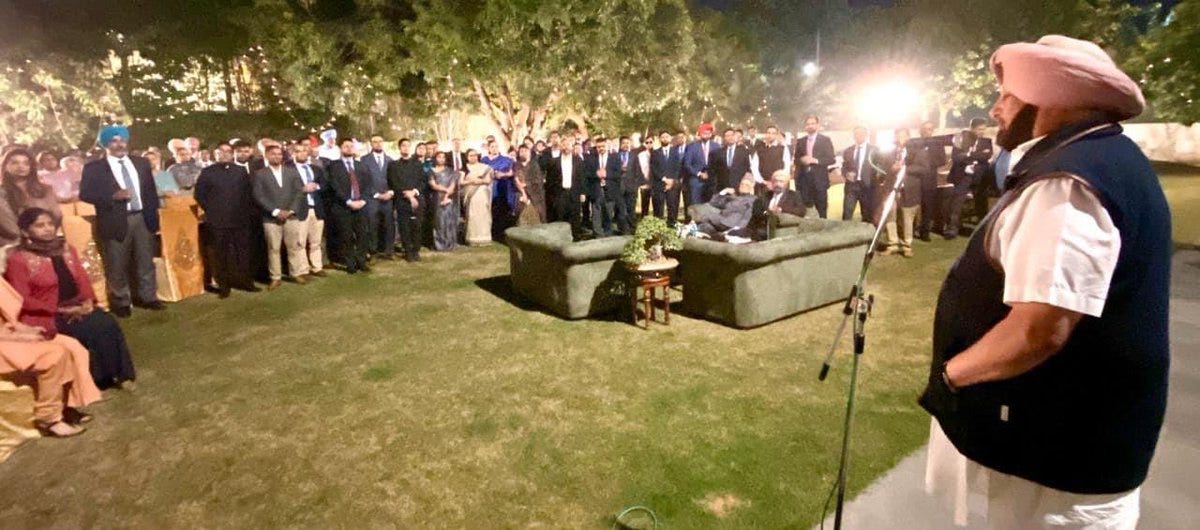Kunwar Natwar Singh: The Legacy of a Diplomat, Statesman, and Royalty
Kanwar Natwar Singh RIP
Kunwar Natwar Singh, the former External Affairs Minister of India and a distinguished diplomat and politician, passed away on August 10, 2024, at the age of 95. Despite his advanced age, he remained sharp and mentally alert, continuing to inspire those around him. We extend our heartfelt condolences on the passing of this patriarchal figure and pray to the Almighty to grant peace to his departed soul and strength to his family to bear this irreparable loss.
Here's a comprehensive overview of his life and career:
Early Life and Education
Natwar Singh was born on May 16, 1929, in the erstwhile Princely State (riyasat) of Bharatpur, Rajasthan, to an aristocratic Jat Hindu family related to the ruling dynasty of Bharatpur. He was the fourth son of Govind Singh and Prayag Kaur of village 'Jagheena', thus earning my the royal title of Kunwar.
Kunwar Natwar Singh received his early education at prestigious institutions traditionally associated with Indian princely families:
Mayo College, Ajmer
Scindia School, Gwalior
St. Stephen's College, Delhi (undergraduate degree)
Corpus Christi College, Cambridge University
Peking University, China (visiting scholar)
Diplomatic Career
Natwar Singh joined the Indian Foreign Service in 1953 and served for 31 years. Some key highlights of his diplomatic career include:
Posting in Beijing, China (1956-58)
India's representative to the Executive Board of UNICEF (1962-66)
Served on several important UN committees (1963-66)
Posted to the Prime Minister's Secretariat under Indira Gandhi (1966)
Part of Indian delegations to various international meetings and UN sessions
Secretary-General of the Seventh Non-aligned Summit in New Delhi (1983)
Chief Coordinator of the Commonwealth Heads of Government Meeting (1983)
Secretary in the Ministry of External Affairs (1982-1984)
He was awarded the Padma Bhushan, a distinguished civilian award, in 1984.
Political Career
In 1984, Singh resigned from the Indian Foreign Service to enter politics. Some key points of his political journey:
Joined the Indian National Congress party
Elected to the Lok Sabha (lower house of Parliament) in 1984 and 1998
Served as a union minister of state until 1989
Appointed as India's Minister of External Affairs in May 2004
Resigned from the position in December 2005 due to the Oil-for-Food scandal
Later joined the Bahujan Samaj Party in 2008, but was expelled after four months
The Oil-for-Food Scandal and Natwar Singh's Resignation
The Oil-for-Food scandal, which erupted in 2005, was a major international controversy that severely impacted Natwar Singh's political career. The scandal centred around the United Nations Oil-for-Food Programme, established in 1995 to allow Iraq to sell oil in exchange for food and other humanitarian needs while under strict UN sanctions. However, the programme was widely exploited by the regime of Saddam Hussein, leading to a web of corruption involving numerous global entities. The Volcker Committee report, released in October 2005, implicated Natwar Singh and the Indian National Congress as "non-contractual beneficiaries" of the illegal oil sales under the programme. The report suggested that Singh, during a visit to Baghdad in 2001 as part of a Congress delegation, facilitated deals under the Oil-for-Food programme for his son Jagat Singh and a family associate, Andaleeb Sehgal. These allegations led to a political uproar in India, with Singh initially being stripped of his External Affairs portfolio and later, under mounting pressure, resigning from the cabinet on December 6, 2005.
The Aftermath and Singh's Defense
The aftermath of the scandal saw an extensive investigation by the Indian government, with Prime Minister Manmohan Singh committing to a thorough inquiry to uncover the truth behind the allegations. In August 2006, an investigation reportedly found Natwar Singh guilty of misconduct in relation to the Oil-for-Food programme, further tarnishing his public image. Despite these findings, Singh consistently denied any involvement in the scandal, maintaining his innocence throughout the investigation and in his autobiography, "One Life is Not Enough." Singh asserted that he was wrongfully implicated in a politically motivated attack. However, the controversy had lasting repercussions, not only leading to his departure from the External Affairs Ministry but also diminishing his standing within the Congress party. The Enforcement Directorate eventually filed charges against his son, Jagat Singh, and Andaleeb Sehgal, though the scandal continued to cast a shadow over Natwar Singh's legacy long after his resignation.
Personal Life and Family Connections
Natwar Singh was related to Captain Amarinder Singh, the former chief minister of Punjab and the titular Maharaja of Patiala. Here's how:
In August 1967, Singh married Maharajkumari Heminder Kaur, the eldest daughter of the last Maharaja of Patiala State, Yadavindra Singh
Heminder Kaur is the elder sister of Captain Amarinder Singh
This marriage connected Natwar Singh to the royal family of Patiala and established a familial relationship with Amarinder Singh.
Naming Story
While there is no specific information about the story behind Natwar Singh's name, it's worth noting that "Natwar" is a name often associated with Lord Krishna in Hindu tradition. The name is derived from Sanskrit and can be interpreted to mean "Lord" or "Master". Given Singh's aristocratic background and the cultural significance of the name, it's possible that it was chosen to reflect his family's status or religious beliefs, but this remains speculative without more detailed information.
Family Tragedies
Kunwar Natwar Singh's life was marked not only by his distinguished career but also by profound personal tragedies. He had two children, a son named Jagat Singh and a daughter, Ritu Kaur Sahiba. Jagat Singh, born on August 8, 1968, was educated at The Doon School and the University of Bristol. He served as an MLA in the Rajasthan state assembly and was the General Secretary of the All India Youth Congress. Jagat married Natasha Kaur in 1993, with whom he had two sons, Hanut Singh and Himmat Singh. However, the family faced an unimaginable loss when Natasha Singh tragically died by suicide on March 17, 2002.
This devastating event was followed by another heartbreak just months later. On July 30, 2002, Natwar Singh's daughter, Ritu Kaur Sahiba, also died by suicide at the age of 31. Ritu had been suffering from depression and was under treatment in London. She was deeply involved in creative fields, pursuing art appreciation, and had worked with Sotheby’s auction house. The two suicides within a few months plunged the family into deep sorrow, casting a long shadow over Natwar Singh's later years, which he lived with much fortitude.
Legacy
In conclusion, Natwar Singh's legacy is marked by his significant contributions to Indian diplomacy, his influential role in shaping the country's foreign policy, and his dedication to public service. Despite his royal lineage, he was known for his humility, suavity, and deep concern for the people he represented. Even amidst the controversies that surrounded him, it is important to remember that neither he nor his son was ever found guilty by any court of law. Singh's ability to navigate complex political landscapes with grace and his unwavering commitment to the welfare of his constituency set him apart as a statesman of rare calibre. His life and career continue to stand as a testament to the profound impact he had on India's political and diplomatic arenas.
Finally, I cannot but refer to the quote from Shakespeare's Julius Caesar, spoken by Mark Antony in Act 5, Scene 5:
"His life was gentle, and the elements
So mix'd in him that Nature might stand up
And say to all the world, 'This was a man!'"
Kawar Natwar Singh RIP
{Personal Footnote}
This photograph, which may not be very clear, was clicked at a dinner hosted by the Chief Minister of Punjab, Captain Amarinder Singh, for all the IAS officers of the state almost five years ago in Chandigarh.
Kunwar Natwar Singh, the brother-in-law of Captain Amarinder Singh, being married to his elder sister, was a special invitee. Though quite frail even at the time, he was mentally very alert, and we struck a conversation that lasted virtually throughout the evening.
Even when the Chief Minister rose to deliver his formal address, I did not deem it necessary to leave him and stand up—an act which many people said was an act of indiscipline or even insolence. I really don’t know, but my instinct told me that I could not virtually abandon the honourable guest sitting alone. If you watch the photograph carefully, or expanded, you may find him and me sitting comfortably on the sofa.
What struck me most about Kunwar Natwar Singh during that evening was his remarkable presence of mind and his ability to engage in deep, meaningful conversation despite his physical frailty. His sharp wit and vast reservoir of knowledge were evident as we discussed a range of topics, from history and politics to the nuances of diplomacy. It was a rare and treasured opportunity to spend such intimate time with a man of his stature, and it left an indelible impression on me. May his soul rest in peace.
Was I right in not standing up, when the CM spoke? What do you have to say?

